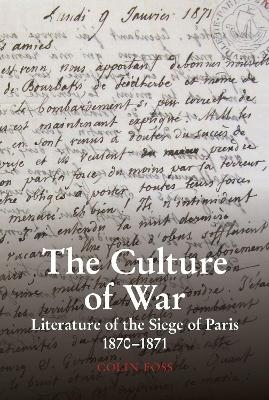
The Culture of War
Literature of the Siege of Paris 1870-1871
Seiten
2020
Liverpool University Press (Verlag)
978-1-78962-192-1 (ISBN)
Liverpool University Press (Verlag)
978-1-78962-192-1 (ISBN)
- Lieferbar
- Versandkostenfrei
- Auch auf Rechnung
- Artikel merken
During the Siege of Paris, literature was big business. A study of cultural production and consumption, The Culture of War examines how Parisians fuelled the industries of literature even as the Prussian blockade isolated them from the outside world in the winter of 1870-1871.
The Culture of War explores the unexpected flourishing of literature both high and low during the Siege of Paris at the end of the Franco-Prussian War, 1870-1871. When Prussian forces completely blockaded Paris, isolating the city from the outside world, Parisians turned to literature to resist the enemy, to fill the idle hours under siege, and to articulate their place in history. This cultural boom was a conscious effort on the part of literary institutions like newspapers, publishers, and theaters to ensure the viability of their industries during a period of political uncertainty. To do so, many publishers, editors, and directors sought legitimacy through populism, promoting literature written by anonymous and unknown authors or that spoke to populist ideas. A study of national tragedy on a local scale, The Culture of War goes beyond traditional narratives of communal or individual psychology, and studies institutional responses to financial and political instability, viewing literature as a product of economic and political forces.
The Culture of War explores the unexpected flourishing of literature both high and low during the Siege of Paris at the end of the Franco-Prussian War, 1870-1871. When Prussian forces completely blockaded Paris, isolating the city from the outside world, Parisians turned to literature to resist the enemy, to fill the idle hours under siege, and to articulate their place in history. This cultural boom was a conscious effort on the part of literary institutions like newspapers, publishers, and theaters to ensure the viability of their industries during a period of political uncertainty. To do so, many publishers, editors, and directors sought legitimacy through populism, promoting literature written by anonymous and unknown authors or that spoke to populist ideas. A study of national tragedy on a local scale, The Culture of War goes beyond traditional narratives of communal or individual psychology, and studies institutional responses to financial and political instability, viewing literature as a product of economic and political forces.
Colin Foss is an Associate Professor of French at Austin College (Texas, USA).
Acknowledgements
Part I: On Stage
Chapter 1: The Boulevards Lose Their Theaters
Chapter 2: Hugomania
Part II: Off Presses
Chapter 3: The Feuilleton at War
Chapter 4: The Dubious Battle of Reichshoffen
Part III: At Home
Chapter 5: Letters to No One
Chapter 6: Historians of the Present
Part IV: In Print
Chapter 7: De-Modernizing Publishing
Chapter 8: To Make the Past Public
Coda
The Siege and State Violence
Bibliography
| Erscheinungsdatum | 16.11.2020 |
|---|---|
| Reihe/Serie | Studies in Modern and Contemporary France ; 6 |
| Verlagsort | Liverpool |
| Sprache | englisch |
| Maße | 163 x 239 mm |
| Themenwelt | Literatur ► Romane / Erzählungen |
| Geisteswissenschaften ► Geschichte ► Regional- / Ländergeschichte | |
| Geisteswissenschaften ► Sprach- / Literaturwissenschaft ► Anglistik / Amerikanistik | |
| Geisteswissenschaften ► Sprach- / Literaturwissenschaft ► Literaturgeschichte | |
| ISBN-10 | 1-78962-192-5 / 1789621925 |
| ISBN-13 | 978-1-78962-192-1 / 9781789621921 |
| Zustand | Neuware |
| Haben Sie eine Frage zum Produkt? |
Mehr entdecken
aus dem Bereich
aus dem Bereich
Universalgelehrter, Polarreisender, Entdecker
Buch | Hardcover (2024)
mareverlag
CHF 39,20


